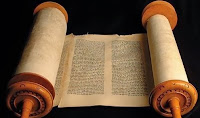Turns out your teacher may have missed something. The word "Stick" in the following verses has some interesting etymology:
Ezekiel 37:16-20Here, then, is The Least You Should Know About Sticks:
16 Moreover, thou son of man, take thee one stick, and write upon it, For Judah, and for the children of Israel his companions: then take another stick, and write upon it, For Joseph, the stick of Ephraim, and for all the house of Israel his companions:
17 And join them one to another into one stick; and they shall become one in thine hand.
18 And when the children of thy people shall speak unto thee, saying, Wilt thou not shew us what thou meanest by these?
19 Say unto them, Thus saith the Lord GOD; Behold, I will take the stick of Joseph, which is in the hand of Ephraim, and the tribes of Israel his fellows, and will put them with him, even with the stick of Judah, and make them one stick, and they shall be one in mine hand.
20 And the sticks whereon thou writest shall be in thine hand before their eyes.
1. Torah Scrolls . Yes, they are rolled around a couple of sticks, or staves (etz hayim -- trees of life), just like your seminary teacher said.
2. The Yad. Nobody touches the scroll. Instead, whomever reads the Torah to the congregation follows the text using a pointer stick, a yad (hand). Pop Quiz: Where else have you seen someone using a pointer stick while explaining things to the assembled congregation?
3. The Canon. The word canon (as in, a canon, or collection, of scripture) comes from the Latin cann, rule, and from the Greek kann, measuring rod, rule, stick. Try substituting the word "canon" for "stick" in the verses above, and see whether it makes more intuitive sense.
So there you have it: Not one, but three, sticks with which to argue that the Book of Mormon was prophesied by Old Testament prophets.
--The Practical Mormon


No comments:
Post a Comment